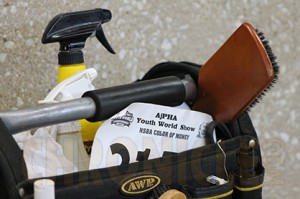It’s Show Time! Tips to Avoid Horse Sickness During Travel Season
Summer is peak season for horse shows and events, and Colorado State University veterinarians remind riders that it’s important if traveling to take steps that will help prevent the spread of equine infectious disease.
Recent cases and outbreaks of equine herpesvirus-1 (EHV-1), which can cause potentially fatal neurologic disease, have drawn attention to the need for prevention. Influenza, salmonellosis and strangles are some other infectious diseases of concern, said Dr. Paul Morley, director of infection control at CSU’s James L. Voss Veterinary Teaching Hospital.
In a new video, “Preventing Infections in Horses Attending Shows and Traveling,” CSU equine experts outline specific, low-cost precautions for horse owners. View it here: http://col.st/1mPraWg.
“Some advance planning and a few low-cost, common-sense preventative measures will help keep horses healthy while traveling,” Morley said. “Protecting the health of your horse makes these steps well worth the time and thought.”
CSU veterinarians advise horse owners to thwart infection by understanding and watching for symptoms of illness. They also recommend precautions including disinfecting trailers and equipment, and preventing contact that could spread pathogens.
Morley recommends that riders traveling with horses take the steps outlined below; these tips are discussed in more detail in the CSU video.
• Prepare for a trip by properly cleaning the horse trailer and consulting with your veterinarian about your horse’s present health, vaccinations, diseases of concern and any other relevant issues. Pack all cleaning equipment and health supplies needed on the road.
• Avoid strangers, and don’t borrow or share. Contagious diseases are transmitted through contact – meaning direct nose-to-nose contact among horses, as well as your horse’s contact with surfaces that an infected animal might have contaminated with saliva, respiratory secretions or manure. Bottom line: Separate your horse from other horses, and use only your own tack, grooming, feeding and watering equipment.
• Create a clean environment for your horse during a show or event. If possible, set up portable panels to confine your horse on event grounds, or fully clean and disinfect on-site stalls before housing your horse at an event.
• Monitor your horse for signs of illness. During an event, keep tabs on your horse’s temperature; monitor feed and water intake to ensure it is normal; and watch for other signs of illness. Ask your veterinarian for health information and how-to demonstrations, if needed.
• Segregate the traveling horse upon return home. A horse that has been at a show or event may be incubating illness, so keep the horse apart from others for five to seven days and monitor for any illness that might arise before returning the horse to the home group.











